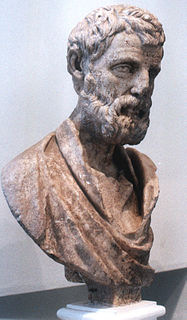 W
WAristides was an ancient Athenian statesman. Nicknamed "the Just", he flourished in the early quarter of Athens' Classical period and is remembered for his generalship in the Persian War. The ancient historian Herodotus cited him as "the best and most honourable man in Athens", and he received similarly reverent treatment in Plato's Socratic dialogues.
 W
WArrian of Nicomedia was a Greek historian, public servant, military commander and philosopher of the Roman period.
 W
WHerodes Atticus was an Athenian millionaire, politician and sophist who served as a Roman senator and as a Roman consul. He was one of the best-known figures in the Antonine Period. Herodes was appointed consul at Rome in 143 and he was the first Greek to hold the rank of consul ordinarius, as opposed to consul suffectus. In Latin, his full name was given as Lucius Vibullius Hipparchus Tiberius Claudius Atticus Herodes. According to Philostratus, Herodes Atticus was a notable proponent of the Second Sophistic. M.I. Finley described Herodes Atticus as "patron of the arts and letters, public benefactor on an imperial scale, not only in Athens but elsewhere in Greece and Asia Minor, holder of many important posts, friend and kinsman of emperors."
 W
WCleisthenes or Clisthenes was an ancient Athenian lawgiver credited with reforming the constitution of ancient Athens and setting it on a democratic footing in 508 BC. For these accomplishments, historians refer to him as "the father of Athenian democracy." He was a member of the aristocratic Alcmaeonid clan. He was the younger son of Megacles and Agariste making him the maternal grandson of the tyrant Cleisthenes of Sicyon. He was also credited with increasing the power of the Athenian citizens' assembly and for reducing the power of the nobility over Athenian politics.
 W
WCommodus was a Roman emperor serving jointly with his father Marcus Aurelius from 176 until his father's death in 180, and solely until 192. The tenure of his reign is commonly thought as marking the end of a golden period of peace in the history of the Roman Empire, known as the Pax Romana.
 W
WDomitian was Roman emperor from 81 to 96. He was the son of Vespasian and the younger brother of Titus, his two predecessors on the throne, and the last member of the Flavian dynasty. During his reign, the authoritarian nature of his rule put him at sharp odds with the Senate, whose powers he drastically curtailed.
 W
WPublius Licinius Egnatius Gallienus was Roman emperor with his father Valerian from 253 to 260 and alone from 260 to 268. He ruled during the Crisis of the Third Century that nearly caused the collapse of the empire. He won a number of military victories against usurpers and Germanic tribes, but was unable to prevent the secession of important provinces. His 15-year reign was the longest in half a century.
 W
WHadrian was Roman emperor from 117 to 138. He was born into a Roman Italo-Hispanic family that settled in Spain from the Italian city of Atri in Picenum. His father was of senatorial rank and was a first cousin of Emperor Trajan. Hadrian married Trajan's grand-niece Vibia Sabina early in his career, before Trajan became emperor and possibly at the behest of Trajan's wife Pompeia Plotina. Plotina and Trajan's close friend and adviser Lucius Licinius Sura were well disposed towards Hadrian. When Trajan died, his widow claimed that he had nominated Hadrian as emperor immediately before his death.
 W
WGaius Julius Antiochus Epiphanes Philopappos or Philopappus, was a Prince of the Kingdom of Commagene who lived in the Roman Empire during the 1st century and 2nd century. He was one of the most prominent Greeks in the Empire.
 W
WRhoemetalces III was a King of the Thracians. He was the son of the Monarch Rhescuporis II. In association with his cousin-wife Pythodoris II, they were client rulers of the Sapaean kingdom of Thrace under the Romans from AD 38 to 46, in succession to Pythodoris’ mother Tryphaena and her brother Rhoemetalces II.
 W
WSolon was an Athenian statesman, lawmaker and poet. He is remembered particularly for his efforts to legislate against political, economic and moral decline in archaic Athens. His reforms failed in the short term, yet he is often credited with having laid the foundations for Athenian democracy. He wrote poetry for pleasure, as patriotic propaganda, and in defence of his constitutional reform.
 W
WXanthippus was a wealthy Athenian politician and general during the early part of the 5th century BC. His name means "Yellow Horse." He was the son of Ariphron and father of Pericles. He is often associated with the Alcmaeonid clan. Although not born to the Alcmaeonidae, he married into the family when he wed Cleisthenes' niece Agariste, and would come to represent their interests in government. He distinguished himself in the Athenian political arena, championing the aristocratic party. His rivalry with Themistocles led to his ostracism, only to be recalled from exile when the Persians invaded Greece. He distinguished himself during the Greco-Persian Wars making a significant contribution to the victory of the Greeks and the subsequent ascendancy of the Athenian Empire.